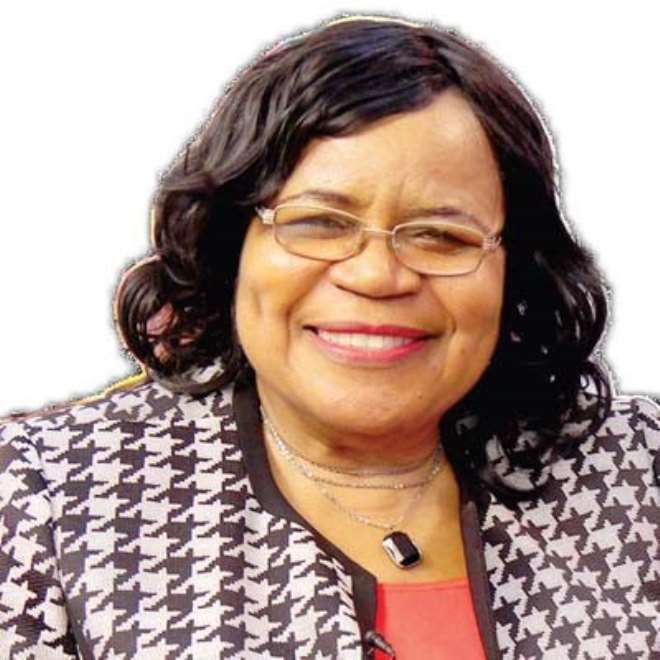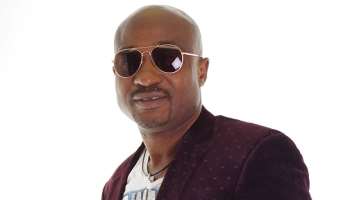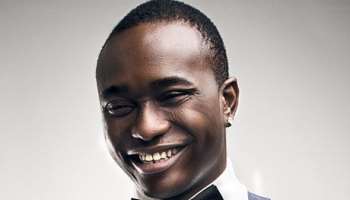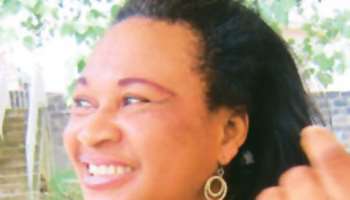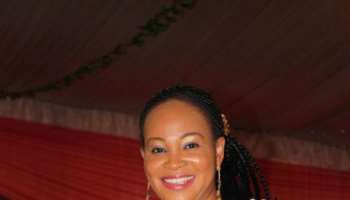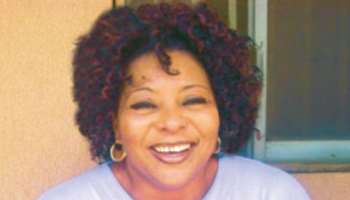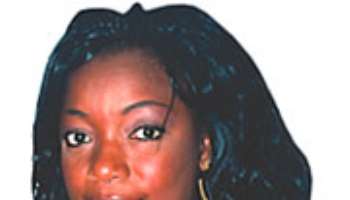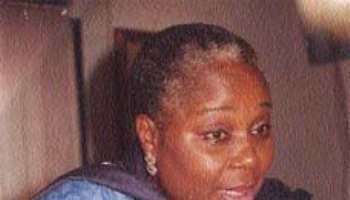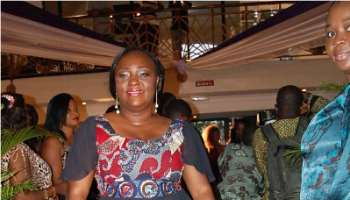Everything can be negotiated in marriage
When Mrs Violet Arene was growing as a girl she was not interested in getting married because of her love for education. She desired to pursue her career to the apogee.
From her voice you could sense a young woman who apparently wants to stay single for being a career woman. But her father coaxed her to marry.
Today, Arene is more than happy by being grand Mum and her blissful home has turn to workshop for managing couple crisis as a marriage councillor.
She counsels people to stay in marriage and uses her TV shows to save 10 thousands young girls out of the street. She has authored 17 books in marriage, leadership, management etc. In an interview with Effect, the 74-year old woman who retired from NNPC is still very vibrant.
She hosts a TV show 'Voice of Eve' and runs the Global Youth Matron of African Women in Leadership Organisation (AWLO).
Excerpts:
How was your growing up?
By the grace of God, I found myself in the hands of loving parents, who even though they did not have money, they gave me love. We knew love in our family. One of my greatest qualities is compassion because my father was compassionate and I think I inherited it from him. Even poverty did not destroy that quality. I also found myself in the hands of the best teachers. Everything just worked in my favour and nullified what could have been a devastating effect of poverty on a hapless girl of the 40s with very little success except to get married. In those days, girls are groomed up, they get married and have children. Some hands that are bigger than all hands catapulted me above these and I found myself one of the two girls, I think, we were the first to enter the university in my own village in 1963 and we were the first graduates in my village.
Did you think of getting married like every other young girl at the time?
No, I didn't. As matter of fact, I was privileged to pursue education, I was determined to get to the peak. I told my father that I was not interested in marriage but he warned me. He was a progressive man for his age, but a man of tradition in the sense that he knew the society's expectation from a woman culturally. The expectation was that one should get married but he made me realise that it was good to be a career woman. The question would be, where is your husband?
At what point did you change your mind?
My father talked me into getting married. At that point, I was already a university scholar and I was still dreaming of traveling to the US, qualify as a PhD, come back to lecture and become a professor. I didn't factor in marriage, but my father kept warning me that there was a time lag that could catch up with you and you might not find a suitable husband. It was my father that convinced me and by the time I listened to him, I softened my heart, Even at that, I had nobody in mind.
How did you meet your husband?
Way back then, it was very rare to have boyfriends and girlfriends. I'm talking about 1963. Usually, people sought for wives for young eligible bachelors and two people spied me. On the same day, two men were supposed to have come. One came before the other one and I drove out with him and I saw the back of the other one coming but it was late. It was destiny. On the same day, I was told that one of them was a medical doctor but my husband happened to be a chemistry lecturer. Everybody in the family preferred the doctor. I like the tag doctor and I eventually got it. My uncle and another lady recommended me to this man and he decided to come and see me. I had never met my husband before, even on campus. He was in the science faculty but I was in the humanities. He decided to come and see me at 5 pm in Queens Hall at the University of Ibadan. In those days, that was how wise people spied out good wives and told you to go and check her out. When my husband came, we went out. That was how the friendship started. It took us two years of friendship before we agreed to get married. He was a lecturer at the University of Ibadan while I was a student.
Even after your marriage, did you consider marriage the best option?
In spite of my limitations in life, coming from a humble background, I was still ambitious, to get a PhD. I found some inner power, inner ability. I wanted to be somebody. The civil war disrupted my career and I stopped. Everybody went back to the university after the war. I had a university scholarship to study for my PhD and I wanted to take advantage of it but in my naivety I forgot that I was married and already a mother. It wasn't easy any more. I cannot deceive you, I felt a resentment for marriage. As a marriage counsellor, I should not destroy the marriage institution. There could be a wave of resentment but you have to rediscover the rightness of what had happened to you and believe in God. For some time, I asked myself, should I run away from this marriage and take up the job of a lecturer at the University of Jos and let my husband know that he is a scholar and I, also a scholar? But I found out that everything can be worked out. Everything can be negotiated in marriage as long as the purpose is positive. I was still able to get my PhD within the ambience of marriage. And I don't regret it. As a matter of fact, I don't know who could have given me the type of children I have.
How were able to balance your career and duties as a housewife?
There must be a trade-off somewhere. I cannot deceive you, tt was like madness. I had to bring in househelps. Househelps are good but they are deleterious to the family unit in the sense that you would think you have a helper, but how much is the help? You will be fooling yourself that you have help while the kids do not get the attention they need from you, or some learning or domestication they need from you.
While in NNPC, what was your leadership style?
In my own department which was the largest department at that time, we had to train all potential managers. Every chief officer had to pass through us for three months and we were teaching them, so there were activities, a lot of set up. My management style? I don't know how to exercise authority. I don't feel a sense of power at any time, I cannot lord it over anybody. It is just my nature, but then, I'm very strict. I am a boundary manager-- You must not do this, you must not do that. Many at times, unfortunately, I have disappointed some people. I wasn't the sweetie mummy they thought I was because when they cross the boundary I can be very strict and you will be sorry for yourself.
What is the African Women Leadership out to achieve?
Leadership is key; it is the determinant in every situation, from the nation to the family. Everything rises and falls on leadership. The type and qualities of leadership determines the fate and fortunes of the family and the nation. Men have been leaders, men have been known to be leaders. Women are supposed to play the second fiddle, that is how we say it, but we are discovering that there should be complementation.There is no way women can oust men. But men are missing something in running the world. They are missing out the leadership essence of women by subjugating them and in some cases, abusing then. Women are leaders. Why do I say so? Leadership is about influence and those who influences people most are women.
What AWLO is doing is what the nation should grab on to, the same with Africa that has suffered a lot from the omission of quality leadership.
What is the one mother, one child mantra about?
The one mother, one child mantra is about exercising the muscle of the heart of women. How can you call yourself a mother when there are many hapless children out there? One Mother One Child encourages you to pick up a child and educate. Education is the key to unlocking the potential of talents anywhere. So when you pick up a child, it shows you are mother, you are a social mother and when you train that child, it shows you believe in education. A leader develops. A leader who does not develop others is not a leader.
You are over 70 years and looking healthy and strong, what is the secret?
My secret is God. I had never visited a health farm. I hear about women who go to health farm and spend a lot of money. I don't do any special diet to stay healthy. I know they have all the products all over the place, anti-ageing this and that. Those are not my forte. My forte? If you believe in God, spend time praying, living a spiritual life. When you spend time with God, the flesh is pushed under, once the flesh is under, the spirits takes over. We must invest more in God. That is my secret.
Do you have any regrets in life?
I love music and I paid for my kids to take piano lessons, they were passing their exams and were members of the musical society. Maybe I did not stumble on the right musical instrument. I was forcing myself to play the piano. I even hurt my eyes. I regret I am not able to play any musical instrument. I already told my grandson 'make sure you learn to play a musical interest when you are old you may just want to relax, or while meditating, you might just want to play the guitar.' I wish I could play a musical instrument.
A lot of young ladies nowadays don't want to stay in marriage. Instead, they want to be single mothers. What advice do you have for people like that?
They do not understand what marriage is all about. I have written about 17 books on the topic. The 18th is on the way. In my book entitled, Better Days for Your Marriage I cautioned everybody that I have learnt from experience that no matter how consistent you are in your marriage, go and check it out with God. Should it be so, marriage should be in line with the purpose of God for marriage.
Tell us about your TV show `Voice of Eve,' what inspired it?
I presented Kith and Kin for six years on NTA.. It was very popular before the cable TV came. Everybody watched it and gave me a sense of success in TV presentation.I nurtured experience up till I was able to set up my own show, The Voice of Eve, for women. The programme is now part of AWLO. I found in the television, an instrument of power in education and enlightenment. I think it is wonderful for women, especially women who don't like to talk. - The Sun.
Latest News
-
 Influencer Nickie Dabarbie Lays Strong Allegations
Influencer Nickie Dabarbie Lays Strong Allegations -
 Small Money" : Daniel Regha Berates Nasboi New Son
Small Money" : Daniel Regha Berates Nasboi New Son -
 “Why You No Gree Get Belle For Me": Portable Quest
“Why You No Gree Get Belle For Me": Portable Quest -
 “Men Are Crazy"; Brymo Questions Tiwa Savage
“Men Are Crazy"; Brymo Questions Tiwa Savage -
 Daniel Regha Admonishes Ruger Over His Recent Comm
Daniel Regha Admonishes Ruger Over His Recent Comm -
 Ruger Faces Backlash From Netizens Over Boat Cruis
Ruger Faces Backlash From Netizens Over Boat Cruis -
 Daniel Regha Mocks Government, Speaks On Cubana Ch
Daniel Regha Mocks Government, Speaks On Cubana Ch -
 Emoney Promises To Sponsor Children Of Late Junior
Emoney Promises To Sponsor Children Of Late Junior -
 My Crush Made Me Leave Acting For Slinging-Tiwa Sa
My Crush Made Me Leave Acting For Slinging-Tiwa Sa -
 Division Among Nigerians As Cubana Chief Priest Is
Division Among Nigerians As Cubana Chief Priest Is


